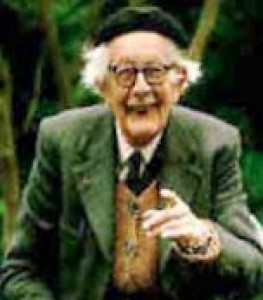Piaget 1896-1980
If you think about it, the world never considered cognitive thinking until Piaget arrived. Children had been thought as nothing more than passive recipients of information poured in by teachers and parents, a view Piaget soundly rejected. For over fifty years, Piaget worked on his theory, perfecting it, trimming it of all excess, adjusting it with Swiss precision until it was accepted that infants and children were active participants in their own cognitive development, organizing what they knew into a conceptual framework that he called schema – a mental mold for their experiences.
He started by studying mollusks (shellfish), was intrigued by the discovery of an albino bird, supported the work of other scientists, and worked towards a PhD in Zoology. This scientific training was certainly useful in forming his cognitive development theory but at the beginning, Piaget also devoted a lot of energy to the philosophy of it, trying to reconcile science and religion. World War I influenced his thinking about morality and equilibrium deeply. This emphasis on morality was later minimized. It is good to be reminded that his cognitive development theory did not arrive fully formed. In fact, Piaget inhabited a world still adjusting to the theory of evolution.
Lamarkian evolution was an influence in Piaget’s early years. ‘Soft inheritance’ as it was then know was particularly prominant amongst Swiss scientists. It is now discredited. Lamarkian’s argued that instead of natural selection as the driving agent behind evolutionary changes as Darwin believed, behaviour traits could be passed on to the next generation (almost like Vygotsky … but not quite). In other words, Lamarkian’s considered characteristics as inheritable. Piaget anticipated similar debate on his cognitive development theory so he created his Genetic Epistemology discipline to ensure constant exploration of his theory.
Vidal’s 1994 biography revealed Piaget’s own development was “not quite as heroic” as Piaget suggested himself in his several autobiographies – but nothing more outrageous than that. He was a devoted scientist with a dogged focus. Reviewers of Vidal’s biography highlighted the conflicting distractions with which Piaget had to wrestle. I think it is a testament to Piaget’s fortitude and intelligence that he constantly adapted his original theory as new information was discovered. I also give Piaget credit for a theory without gender bias.
Critics may say his findings only work with Piaget assigned tasks, that his writings are too vague and his definitions impossible to qualify. They may complain that children can display the skills of two stages at one time. The Formal Operational stage alone may contend with different aspects of maturity not imagined by Piaget. His defenders insist we understand his essential theory before we move on, however, because it forms the basis of so much that follows (Lourenco & Machado, 1996). In a world still adjusting to the theory of evolution, Piaget set about to make his mark and it is a mark that still stands.
References
Cahan. E. D. (1995). Review of the book ‘Piaget before Piaget’. History of Education Quarterly, 35, 3, 325-328.
http://ebooks.bfwpub.com/psychinquiry/shell.php?activity=piagets_water_jar
http://en.wikipedia.org/wiki/Lamarckism
http://www.massey.ac.nz/~wwpapajl/evolution/…/DL/criticism.html
Lourenco, O. & Machado, A. (1996). In defense of Piaget’s Theory: A reply to 10 common criticisms. Psychological Review, 103, 1, 143-164.
Pickren, W. (1996). Review of the book ‘Piaget before Piaget’. Isis, 2., p. 383

